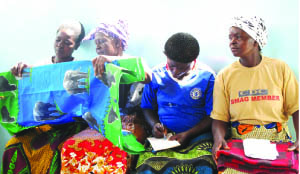By GETHSEMANE MWIZABI –
SAFE motherhood is key to achieving Millennium Development Goal (MDG) number eight, which is concerned with improving maternal health.
The Rotary Club of Ndola-Mukuba has in the recent past carried out robust safe motherhood programmes by ensuring that several women in Ndola receive the care they need to be safe and healthy throughout pregnancy and child-birth.
This has been done through the training of Safe Motherhood Action Groups (SMAGs).
So far, over 100 SMAGS have been trained in collaboration with the Ndola District Community Health office, who identify women in various communities, especially those living on the outskirts of Ndola like Dola Hill, Kaniki, Kaloko, Tug Agan and several other communities.
Recently, the club spent K105,000 on training 50 SMAGS. The Rotarians also donated bicycles to make SMAGs’ work easy in communities they operate in.
“We are very passionate about maternal health. Very few people have access to health facilities especially those in far-flung areas,” said Clever Mwempe, in charge of projects.
He said investment in safe motherhood not only improves women’s health and the health of their families, but also increases the labour supply, productive capacity and economic wellbeing of communities. This ultimately adds a positive impact on the economy.
Mr Mwempe said unwanted or unplanned pregnancies can interfere with women’s social and economic activities and cause emotional and economic hardship not only to women but also to their families.
He said the Rotary club has been touched by women’s maternal needs in areas where the nearest health post was situated several kilometres away.
The overall objectives of the SMAG programme are to:
• Strengthen community participation in maternal, newborn, and child health
• Improve community knowledge on safe motherhood issues through health education
• Enhance the community’s utilisation of reproductive health services
• Increase male involvement in safe motherhood activities
• Strengthen partnerships between the community and health system
The SMAG members give personal attention to each pregnant woman, following her throughout the pregnancy and after her baby is born in order to ensure the safety of both mother and child.
The message that comes through at the community education meetings they hold is that mothers are a priority for everyone and they should not be die whilest in pregnancy.
They are not allowed to conduct deliveries only in emergency cases.
“We shall continue to provide support for safe motherhood programmes because they are important. Our goal is to contribute to the reduction of maternal mortality any way we can,” he said.
According to UNICEF, in Zambia, only 47 per cent of births are attended by a skilled health worker at health institutions. Home delivery is high (53 percent). Communities in rural areas have limited access to health care. It is currently, estimated that in urban areas approximately 99 per cent of households are within 5 kilometres of a health facility, compared to 50 percent in rural areas. Further, socio-cultural factors compound families’ health care seeking behaviour such that many children are taken late to health facilities and pregnancy is not given special care. Knowledge about post natal care is low. Knowledge and practice on infant and young child feeding practices are low. Infectious but preventable diseases contribute significantly to child deaths and illnesses, including malaria, respiratory infections, and diarrhoeal diseases. All these factors have contributed to Zambia’s high maternal, newborn, and childhood death indicators.
Ultimately, the Rotary Club of Ndola-Mukuba should be commended for promoting safe motherhood through the training of SMAGS.
As far as safe motherhood is concerned, a lot has been done but still more has to be done. There is need to make maternal health an urgent health priority and to ensure that the necessary political and financial support is dedicated to this effort.
It is said in Zambia that out of every 100,000 women who give birth 591 women die.
When a mother dies, children lose their primary care-giver, communities are denied her paid and unpaid labour, and countries fore-go her contributions to economic and social development.
As Dr Mary Zulu, National Chairperson for Planned Parenthood Association (PPAZ) once put it “A woman’s death is more than a personal tragedy – it represents an enormous cost to her nation, her community and her family. Any social and economic development that has been made in her life is lost. Her family loses her love, her nurturing and her productivity inside and outside the home.”







